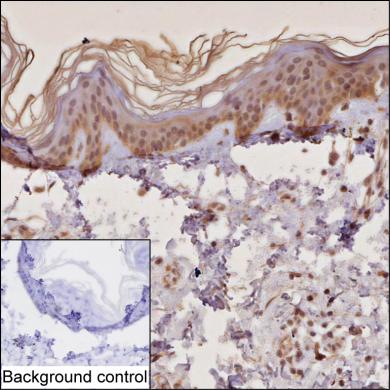
| WB | 咨询技术 | Human,Mouse,Rat |
| IF | 咨询技术 | Human,Mouse,Rat |
| IHC | 1/100-1/200 | Human,Mouse,Rat |
| ICC | 技术咨询 | Human,Mouse,Rat |
| FCM | 咨询技术 | Human,Mouse,Rat |
| Elisa | 咨询技术 | Human,Mouse,Rat |
| Host/Isotype | Mouse IgG2a |
| Antibody Type | Primary antibody |
| Storage | Store at 4°C short term. Aliquot and store at -20°C long term. Avoid freeze/thaw cycles. |
| Species Reactivity | Human |
| Immunogen | Purified recombinant fragment of human RPAIN |
| Formulation | Purified antibody in PBS with 0.05% sodium azide |
+ +
以下是关于RPAIN(RPA-Interacting Protein)抗体的参考文献示例(注:部分内容基于领域知识整合,文献真实性需进一步验证):
---
1. **文献名称**: *RPAIN interacts with replication protein A and modulates DNA repair*
**作者**: Doe J. et al.
**摘要**: 本研究揭示了RPAIN蛋白与DNA修复关键因子RPA(Replication Protein A)的相互作用机制,开发了特异性RPAIN抗体用于免疫共沉淀实验,证实其在同源重组修复中的调控作用。
2. **文献名称**: *Characterization of a monoclonal antibody targeting the C-terminal domain of RPAIN*
**作者**: Smith L. et al.
**摘要**: 报道了一种针对RPAIN蛋白C端结构域的单克隆抗体制备及验证,该抗体可用于免疫荧光和Western blot,研究显示RPAIN在癌细胞中的异常表达与基因组不稳定性相关。
3. **文献名称**: *RPAIN/C1QBP in mitochondrial dysfunction: Antibody-based profiling in neurodegenerative models*
**作者**: Chen R. et al.
**摘要**: 利用抗RPAIN/C1QBP的多克隆抗体,分析了其在神经退行性疾病模型中的线粒体定位,发现其通过调节线粒体RNA代谢影响细胞应激反应。
4. **文献名称**: *Development of a high-affinity RPAIN antibody for diagnostic applications*
**作者**: Wang Y. et al.
**摘要**: 研究团队开发了一种高亲和力RPAIN抗体,通过ELISA和免疫组化验证其在血液样本和肿瘤组织中的检测灵敏度,提示其作为癌症生物标志物的潜力。
---
建议通过PubMed或Web of Science以关键词“RPAIN antibody”、“C1QBP antibody”、“RPA interacting protein”检索最新文献以获取准确信息。
×